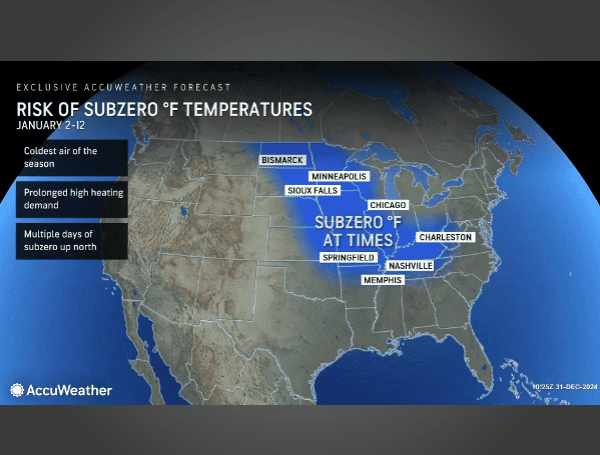A powerful storm system is expected to sweep across the United States, bringing snow, ice, and severe weather to parts of the Plains, Midwest, and East Coast from this weekend into early next week. The storm coincides with the arrival of bitterly cold Arctic air, which could lead to the coldest January temperatures in over a decade in some regions.
As colder air moves over the Great Lakes, heavy lake-effect snow is forecast to impact areas in Ohio, Pennsylvania, and New York.
AccuWeather predicts 12-24 inches of snowfall, with localized totals reaching up to 48 inches in some spots through Sunday.
READ: Fox News Channel Dominates 2024 Ratings, Secures Largest Audience Share In Nearly A Decade
A strengthening storm system will bring snow, a wintry mix, and freezing rain across the Plains and Ohio Valley, advancing into the mid-Atlantic and Northeast early next week.
- Saturday: Snowfall begins in the Plains, causing slick roads and reduced visibility.
- Sunday: Thunderstorms, fueled by Gulf moisture, will bring heavy rainfall and severe weather, including hail and damaging winds of up to 70 mph, to the Gulf Coast.
- Monday-Tuesday: Snow and ice are expected in the Ohio Valley and mid-Atlantic, potentially impacting morning commutes.
AccuWeather meteorologists are closely monitoring the potential for a significant snowstorm late next week. If the storm strengthens, it could bring heavy snow and ice from the Gulf Coast to the Northeast. If weaker, the storm may move offshore with minimal impact.
Several Arctic blasts are forecast to bring the coldest January air in over a decade to much of the eastern United States.
- Extreme cold:
- RealFeel® temperatures could plunge to -30°F in the northern Plains and Upper Midwest.
- Northern Florida and the Gulf Coast could see RealFeel® temperatures of 10-20°F.
- Energy impacts:
- Bitter cold could disrupt natural gas production in the Northeast, especially in the Marcellus Shale region.
- Increased heating demand may lead to elevated energy prices in the U.S. and Europe.
READ: Appeals Court Upholds Plea Deals For 9/11 Terrorists Allowing Them To Skirt Death Penalty
AccuWeather experts warn that this Arctic outbreak could bring sustained cold temperatures rather than a brief cold snap.
- Historical comparisons:
- The Southeast could experience its coldest January since 2018.
- The Upper Midwest may see its coldest January since 2014.
AccuWeather Lead Long-Range Expert Paul Pastelok noted, “The key here is that the Arctic outbreak will involve many days and not just be a quick one-to-three-day event. A trainload of Arctic high-pressure areas will move southward into the U.S. from the northern Plains to the Southeast states with the pattern.”
Residents in affected areas should prepare for hazardous travel conditions, potential power outages, and increased heating needs. Stay updated with local forecasts and take precautions to stay safe during this prolonged winter weather event.
Please make a small donation to the Tampa Free Press to help sustain independent journalism. Your contribution enables us to continue delivering high-quality, local, and national news coverage.
Connect with us: Follow the Tampa Free Press on Facebook and Twitter for breaking news and updates.
Sign up: Subscribe to our free newsletter for a curated selection of top stories delivered straight to your inbox.



